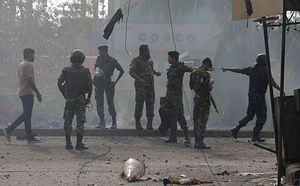For most Sri Lankans, the Easter Sunday of 2019 started off like any other Sunday. Those belonging to the Christian minority, which accounts for around 7 percent of the country’s total population, were gathering en masse at churches across the island to attend the Easter morning masses; the school-aged children were waking up to what they thought was going to be the last day of their Sinhala and Tamil new year vacation; and most others were returning to the cities after enjoying successive long weekends, which is a rare luxury. For the tourists visiting the island, which was touted as one of the top travel destination for 2019, it was imperative to start their day off early if they were to avoid the frequent evening showers.
Little did we know that April 21 was about to go down in history as one of Sri Lanka’s darkest days. Between 8:45 a.m. and 9:05 a.m., multiple explosions rocked several popular churches and luxury hotels in the country’s capital of Colombo. Harrowingly, it quickly became evident that the target was not just one city, with explosions taking place in the eastern coastal town of Batticaloa, located over 300 kilometers from the capital, and Negombo on the west coast, just under 40 kilometers north of Colombo.
Sri Lanka has been through a lot. The country has witnessed a protracted war that dragged on for over two-and-a-half decades. It has even had to deal with a brutal Marxist insurgency in the south for good measure. So one could be excused for thinking that a country that has witnessed so much bloodshed would be braced for any impending attack, irrespective of the scale. However, for those of us living in the emerald isle, senseless killing was a thing of the past — or so we thought.
Many reputed international media outlets scrambled to make sense of what was unfolding in Sri Lanka. A few of them were quick to link the Easter Sunday attacks to the country’s “violent past” based on evidence that was piecemeal at best. With further evidence trickling in, they shifted their narrative to incorporate the rise in Buddhist nationalism, and the prevailing tensions between the Buddhist and Islamic communities in the country, into their reports. But these reports overlooked a key factor: the religion observed by a majority of the victims.
The country’s Christian population, which appears to have been the main target of Sunday’s attacks, is comprised of both Sinhalese and Tamils. While no community in the country was spared during the civil war that had plagued the nation for decades, such a coordinated attack specifically targeting the Christian community was unheard of. As such, this appears so far to have been for all intents and purposes an attack carried out specifically against Christians — and quite possibly meant as retaliation for the recent mosque attacks in Christchurch, New Zealand . In Sri Lanka, the perpetrators found a target with three crucial factors in place: a significant Christian population, low levels of threat perceptions, and a flourishing tourism industry. As Christchurch reminded us all, those resolving to acts of violence do not require the targeted group to represent a majority in a country. With Sri Lanka not experiencing a major terrorist attack in nearly a decade, the country was seen as one of the more peaceful in the region, with freedom of movement no longer viewed as the luxury it once was. On top of that, the boom the tourism industry has witnessed in recent times ensured that the presence of foreigners, particularly “Westerners,” at the targeted luxury hotels was pretty much a given.
Addressing the nation on Sunday evening, Prime Minister Ranil Wickremesinghe claimed that the country’s intelligence services were aware of a possible and impending terrorist attack, but had failed to brief him or his cabinet. Moreover, a prominent minister in the Sri Lankan government has since tweeted a photo of an intelligence memo identifying a local “radical extremist Islamist” group known as Tawhid Jamaat as the group that was planning to carry out the attacks mentioned by the prime minister.
Amidst such uncertainties and contentions, and with the true scale of the catastrophe still emerging, it is essential that the authorities ensure that all those involved in this heinous act are swiftly apprehended and held accountable. Moreover, it is imperative for Sri Lanka’s political leaders to draw from New Zealand Prime Minister Jacinta Arden’s crisis response to defuse the prevailing tensions. A failure on either count will only help feed the globally prevailing anti-Muslim narrative. The Easter Sunday attacks once again reminded us all that responding to violence with violence will only keep the cycle going.
Charudaththa Ekanayake is a freelance consultant based in Sri Lanka with a Masters in International Relations at the London School of Economics and Political Science, U.K.

































